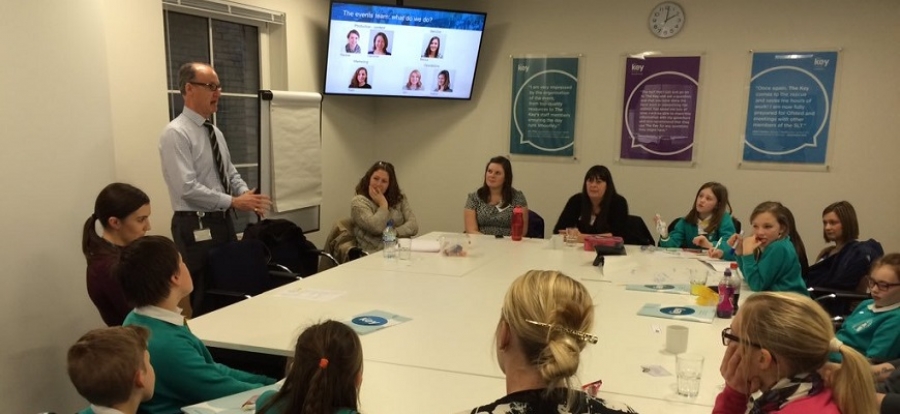You're CEO of The Key, which turned 10 last year! Tell us about the organisation, and what your role involves.
We provide school and MAT leaders with essential leadership and management support by way of information and online tools. The whole point is to take the burden off them so they can concentrate on raising education standards. We started as a government pilot, with the aim of rolling out to all schools. The economy crashed and funding was withdrawn, so we bootstrapped it ourselves and gradually got to the point of covering our costs over the first three years.
Our school leader service now has 10,500 schools subscribing. By popular demand, we added a service for governors and MAT directors/trustees, which now has about 4,000 subscriptions across the country, many of those in MATs. In the last couple of years we have taken all our software development in house, have built a Compliance Tracker which has proved hugely popular, have developed an extensive range of modules to support schools in running their own CPD, and have recently launched a Safeguarding Training Centre.
What are the main challenges you face as the chair of a seven-school MAT, and how do you tackle them?
It’s early days. We have brought together four Primaries and three Secondaries, only one of which was in a category. We have been working hard to get one of the Secondaries out of special measures, and have been greatly helped by the Royal Grammar School (a leading independent school and an associate member of the MAT) and the University of Surrey, whose vice provost sits on our board.
There is so much to do. Just one small example: we have five different pay policies across the group, which need harmonising. We only have a handful of staff at the centre. There is a lot of communication with the local schools needed to enable them to feel they are part of a bigger venture. It’s all about making sure that we have the highest standards of education for every child in our schools, wherever they live. We are setting the bar high, and, yes, ruffling a few feathers. Our board is determined that we reach the very highest standards across the group. I have been accompanying the CEO and heads to visit schools where results have been outstanding to see what we can learn.
You also released your first book - Mining for Gold: Stories of Effective Teachers - in 2017. How did this come about?
Well, to be honest, it wasn’t as if I had a book inside me screaming to get out. Not at all. I was not the slightest bit desperate to write a book, and didn’t actually think I could manage such a task. The publisher, John Catt, kept nudging and prodding me over a period of about nine months, and I eventually sent them an idea which they liked. I sat on this for about four months before I received another email: “just wondering how things were going”. Yuck. So I sat down with a big sheet of A3, split it into 30 boxes and tried to fill each one with a chapter summary. Once all the squares were full, I got going. I had big problems with my left hip during the year, which meant I couldn’t play any sport or walk the dog. So, I wrote instead. I’d been told to just write as you speak, so I did. I actually quite enjoyed it, writing about teachers and lecturers I had come across who had been highly effective. If all your readers buy a copy, it will probably win education book of the year. I’ll invite you to the party.
Inspired for next week after reading lots of this by @RocheFergal. An excellent read that reminds you of the impact of wonderful teachers! pic.twitter.com/8tpcWCMZTn
— Jamie Thom (@teachgratitude1) November 5, 2017
As someone who was a headmaster in 1995, how would you say school leadership has evolved throughout the past two decades?
Wow, that’s a 25-marker, isn’t it! I did quite a lot of teaching when I started out, and felt closely connected to what was going on inside the classroom, as the head. Since then we’ve tried to reconceive headship as the equivalent of being a chief executive, and I don’t think we’ve done ourselves any favours, to be honest. The headteacher should be the lead role in any school, but heads should focus only on the hugely complex and challenging task of teaching and learning. All the other roles, like finance and IT and procurement and premises and recruitment, should be given to specialists (I guess I’m thinking this is much more achievable in a big school or a MAT). The head will have some involvement in all of these, but not take lead responsibility for them. In the best schools, the head is stuck into figuring out how to bring about the most effective learning in the most efficient way. That’s their skillset, so let’s help them to achieve that, and stop distracting them.
Tell us more about the experiences and people who helped get you to where you are today.
Well, I know I’m quite a driven person, who focuses clearly on what they want to achieve. I guess I got that from my mum, who went to a convent school in rural Ireland, but somehow decided she was going to become a doctor. She’d had TB at 11 and her father had died when she was 14, plus she was one of nine children. I’ve always hugely admired her resilience and determination, which she has passed down the family gene tree. I’ve had plenty of knocks in my career and a couple of false starts, which have taught me far more than my successes, to be honest. Losing funding for The Key might have tempted me to give up, but I was pretty determined to make it work, and I had some great people working with me who were just as passionate. The people who influence me most are the amazing heads I get to visit in quite a few of our schools, people who have done incredible things for the children through their leadership. I talk about them a lot.
What do you hope to achieve in the next year?
Oh boy, oh boy – difficult to look a whole year ahead. Well, we are determined to provide more support, information and tools to school and MAT leaders so that they can focus more and more exclusively on teaching. To that end, we shall be adding to what we offer our schools and have lots of plans that we will unveil gradually throughout the year. I can’t be more specific yet, but I’m excited by what we’re working on right now. I definitely don’t want to write another book, and will walk the dog instead. And I hope I stay cool as my daughter approaches her A levels.
Want to receive cutting-edge insights from leading educators each week? Sign up to our Community Update and be part of the action!


















